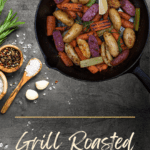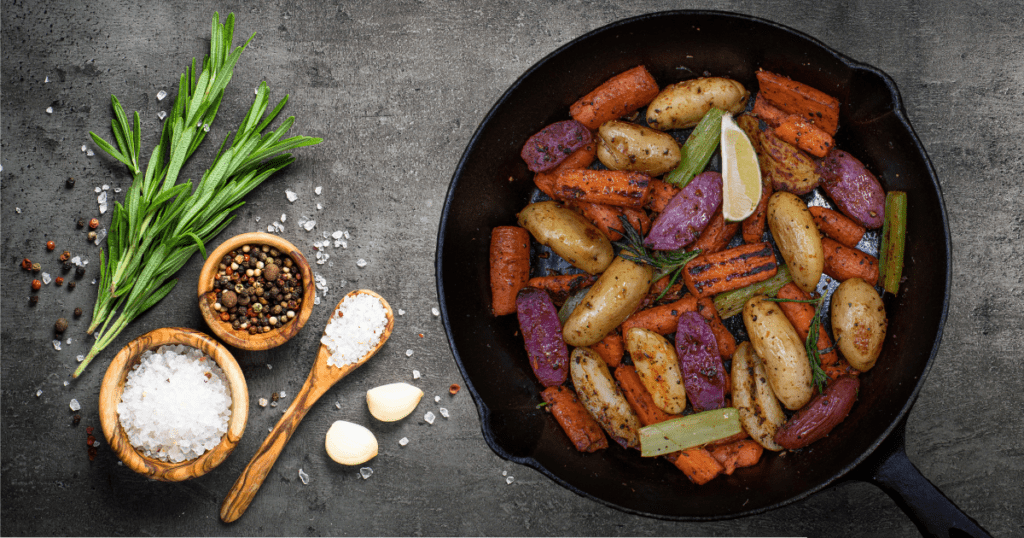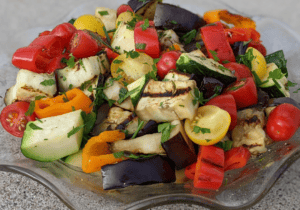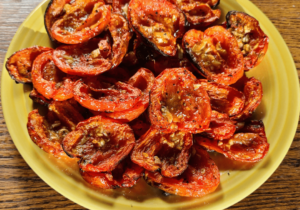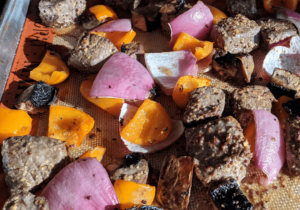Grill Roasted Vegetables – keep the heat out of the kitchen!
Can you roast vegetables on a grill?
We’ve all gotten on the bandwagon by now with OVEN roasted vegetables. This simple process of roasting elevates and intensifies the flavor profile of almost any vegetable. And in the peak of summer, with so much fresh produce in season at great prices (or from your garden!) you want to use high heat to get all the yummy roasted deliciosity, but not put all that heat in your house which you’ll just have to crank the AC to get it out again (defeating the benefit of cheap summer produce). What’s the solution… grill roasted vegetables! Let’s keep the heat outside if we can!
What's the Difference Between Roasting and Baking
Roasting involves cooking foods, like meat and vegetables, that already have a solid structure before you begin cooking. Baking is usually the term applied to foods that are mixed together before cooking, not “whole.”
Roasting also implies a higher temperature than baking (400-450℉ for roasting, in contrast to grilling, which occurs at temperatures in excess of 500 degrees) and thus more pronounced browning. Both baking and roasting use indirect heat, which cooks food pretty evenly since all of the food's surfaces are equally exposed to heat.
Roasting your vegetables on the grill
Your grill is essentially just like an outdoor oven. You have a heat source with an enclosed cooking area, creating the same conditions as an oven.
When you place ingredients on the grate of a grill directly above the gas or charcoal, you're cooking with direct heat. This produces beautiful sear marks, but may not always be the best option. Cooking next to a heat source rather than directly above it, especially if there is a pan (or even foil), is using indirect heat.
Roasting vegetables using indirect heat will cook them more gently than grilling, and achieve caramelization and the Malliard effect without scorching. This surface browning is the source of so much flavor, yet the intense heat can lead to drier results. At the same time, you want to cook the food uncovered so that it's the hot, dry air delivering the heat, not steam from the food. To meet both these requirements is one of the reasons oil is typically used in roasting.
How to set up the grill for roasting
On a gas grill, heat to desired temperature with all the burners, then turn one off and place your vegetables above that one to cook with indirect heat. With a charcoal grill, similarly, rake the coals to the edges and place your pan over the center.
You can use a special grilling basket, a cast iron skillet, or you can simply put your baking pans inside the grill. Le Cruset enameled cast iron cookware is a good choice.
You don’t want to ruin a good pan so, only use a heavier solid metal pan without non-stick coating, ceramic or glass pans could crack over direct high heat, and thin baking sheets could definitely warp. If you have an upper rack, that is a good spot, or use a few empty cans to raise your baking sheet to a more indirect heat level if needed.
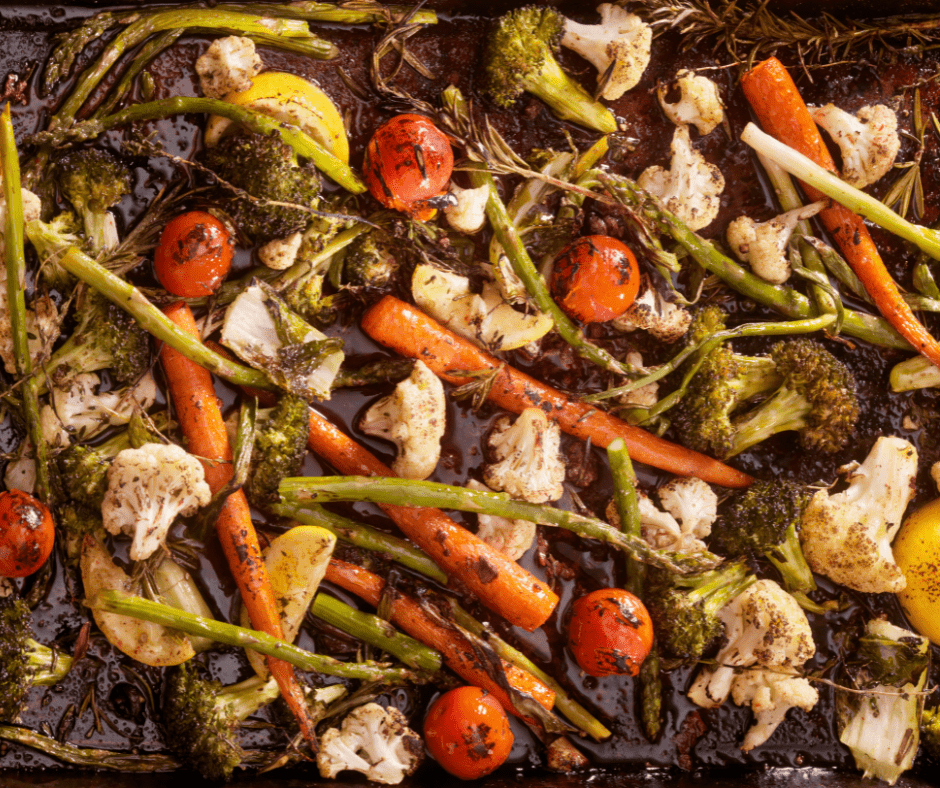
Roasting makes everything delicious
Don't overcrowd the veggies or the hot air won't circulate and the veggies will steam instead of roast.
Using a high enough oven temperature is another important step to make sure your veggies actually roast instead of steaming. A higher temperature absorbs moisture more quickly and gives them a caramelized exterior. Caramelization makes just about anything taste better
What temperature do you use for grill roasted vegetables?
For Roasting vegetables on the grill, you’ll be using a similar temperature as you would in a conventional oven, around 400-425℉
If your grill has 2 burners, you can use both of them to heat the grill to the desired temperature, then turn one burner off and adjust the other to maintain the required temperature.
Once you’ve placed the pans of vegetables, cook with a closed cover, so hot air will circulate to cook the food.
How long to roast vegetables at 400℉
25 to 35 minutes, rotating them about halfway through. Your outdoor grill will probably not be as consistent in temperature as your indoor oven. you will have to tinker with temperatures and times, burners on and off, etc., to find what works for you.
What vegetables are good for roasting on the grill?
Cruciferous roasted vegetables
- broccoli
- cauliflower
- cabbage steaks
Mediterranean roasted vegetables
- eggplant
- tomatoes
- zucchini
- portobello or crimini mushrooms
- garlic
Latin roasted vegetables
- bell peppers
- jalapenos
- poblanos
North American/European roasted vegetables
- potatoes
- turnips
- carrots
- parsnips
Other great vegetables to roast
- asparagus
- broccolini
- beets
- butternut squash
- sweet potatoes
Cut your vegetables into similar sizes to ensure cooking consistency. Smaller pieces have more surface area exposed to the heat, giving them a better chance to crisp and brown. For a playful visual element, you might choose to cut some vegetables, like zucchini and eggplant, into rounds or even on a bias.
You can add herbs or use a marinade if you’d like, but you’ll want to wait to salt them until after they’ve come off the heat.
Do you put oil on vegetables before grilling? Do I have to?
Oil is an important part of the roasting process. Oil the vegetables lightly… you don’t need to use a ton, but using none will result in a dried-out texture instead of crisp and caramelized edges.
Incorporating some oil also enhances the absorption of some of the vegetable’s nutrients.
What kind of oil is best for roasting?
Many recipes will call for the traditional olive oil. The smoke point of olive oil starts out pretty low for extra-virgin (around 325℉), and rises the more refined it is. Even if you use an olive oil that reaches its smoke point it won’t reduce the nutritional value because of olive oil’s intrinsic oxidative stability, but it may impact the flavor of your “good” oil. You might decide to choose extra-light olive oil for roasting and save your flavorful EVOO for finishing.
I personally prefer avocado oil for high temperatures applications since the smoke point is 520℉, and it doesn’t add its own flavor to the vegetables.
How long are grill roasted vegetables good for?
Amazing served hot off the grill, but also scrumptious served chilled, which lends itself to easy food prep options. Remove your roasted vegetables from the tray they were cooked on and allow to cool completely. This keeps them from absorbing any excess oil that might be on the pan.
Once fully cooled, transfer to an airtight container and refrigerate for up to 4 days.
Most roasted vegetables freeze well
The best way to freeze your vegetables in order to preserve their flavor is to cool completely, then divide into portions for single serving or a family/recipe amount. That way you defrost only the amount you need at a time. Remove as much air as possible from the container, then label with the contents and date and store in the freezer.
Roasted vegetables are best used within 6 months of being frozen.
What is the best way to reheat your frozen roasted vegetables?
When you're ready to use the frozen veggies, take them out of the freezer approximately 12 hours ahead of time and let them thaw in the fridge or on the counter.
Reheat at 375℉ in a skillet or oven for about 5 minutes, or air fryer for 2-3 minutes. Avoid microwaving as this will definitely make them soggy or mushy.
For softer vegetables like mushrooms, asparagus, and tomatoes the texture may change, so these are best for stews and casseroles. Firmer vegetables like carrots, potatoes, and parsnips maintain their texture better, and are suitable for a side dish when reheated or in salads.
Heather Lynn Darby helps office and tech professionals disrupt the cycle of chronic stress that undermines their health, and to recover from the negative effects of sitting at a computer all day. Find other articles written by Heather on her coach profile.
If you are largely sedentary at work and rely on your intellectual acumen for success, her take on body-mind interventions will help you find a balance between being "in the zone" and getting the amount of movement that will optimize your mental productivity and prevent health problems.

